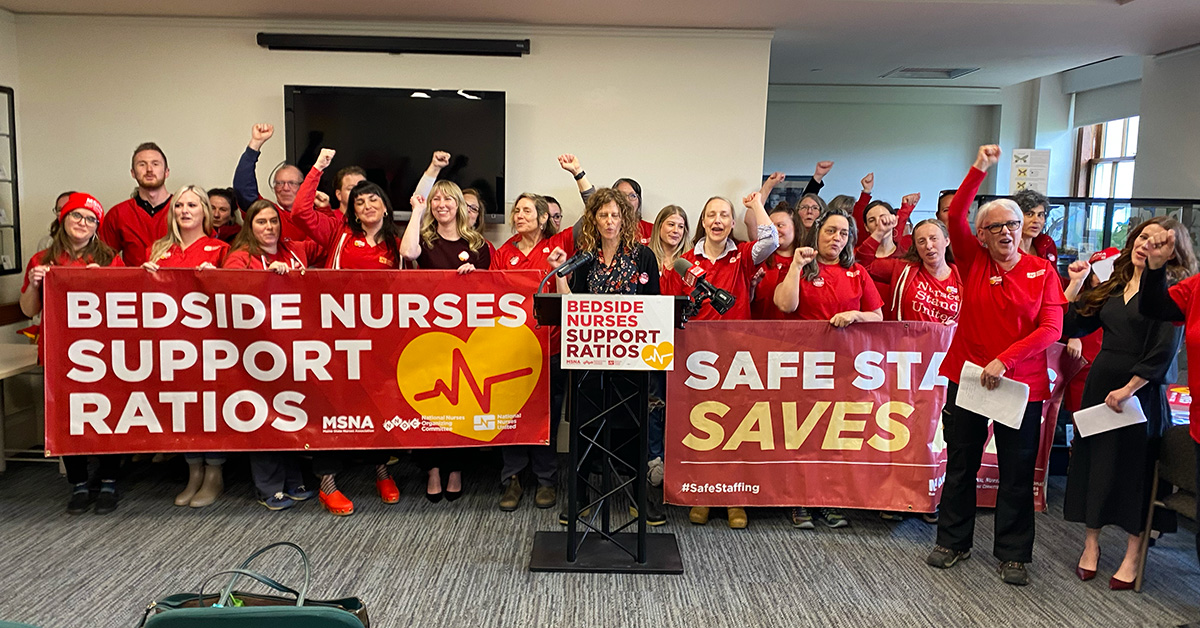Press Release
Nurses rally and testify at Maine state capital for enforceable nurse-to-patient ratios

The Maine Quality Care Act (LD 1639) will limit the number of patients that nurses can be given in their patient care assignments
Today, registered nurse members of the Maine State Nurses Association (MSNA) held a rally in Augusta, Maine, and testified at a hearing before the state legislature’s Labor and Housing Committee in support of the Maine Quality Care Act (LD 1639), a bill that would create legally enforceable nurse-to-patient ratios. This legislation, sponsored by Sen. Stacy Brenner (D-Scarborough), will limit the number of patients that nurses can be given in their patient care assignments. Numerous studies show that placing limits on the number of patients a nurse has in their assignment improves patient health outcomes and protects the health and safety of nurses.
“As nurses, our priority is our patients, not hospital profits,” said MSNA President Cokie Giles, RN. “Without safe and reasonable ratios, nurses cannot give the care they want and have been trained to give.”
Lucy Dawson, an emergency department nurse at Maine Medical Center in Portland, said, “We cannot be the nurses that we want to be when our ratios are too high. I have seen the increase in stress and moral injury that occurs when nurses are stretched too thin. Many of my coworkers are leaving the bedside because they are unable to give the care that patients need and deserve. The moral distress that this puts on nurses is overwhelming. It is no wonder why nurses are leaving the bedside.
“Passing the Maine Quality Care Act is the only way we can make our working conditions better and the conditions for patients safer and therapeutic and also bring nurses back to the bedside,” said Dawson.
“We have 20 years of experience and authoritative data to show that enforceable nurse-to-patient ratios keep patients and nurses safe, can save hospitals money, and bring nurses back to the bedside,” said Giles. “Enforceable RN-to-patient ratios get to the root of the problem and help us solve the current nurse staffing crisis.”
Decades of studies have shown that more nurses result in lives saved and fewer complications. Here are a few highlights:
- Studies show that when RNs are forced to care for too many patients at one time, patients are at higher risk of preventable medical errors, avoidable complications, falls and injuries, pressure ulcers, increased length of hospital stay, higher numbers of hospital readmissions, and death.
- A 2021 study found that each additional patient per nurse is associated with 12 percent higher odds of in-hospital mortality, 7 percent higher odds of 60-day mortality, 7 percent higher odds of 60-day readmission, and longer lengths of stay, even after accounting for patient and hospital covariates including hospital adherence to sepsis bundles.
- Numerous studies have documented disparities in care in hospitals that serve communities of color. Studies have also found that registered nurse staffing levels in hospitals that serve communities of color are often lower, contributing to these disparities in care. Setting a single standard of nursing care across hospitals will improve outcomes for patients of color, including reduced readmission rates, increased satisfaction, and better obstetrical outcomes.
- A 2015 study comparing occupational injury and illness rates before and after the California RN staffing ratios law was passed found that the law was associated with a 31.6 percent reduction in occupational injuries and illnesses among RNs working in hospitals in California.
MSNA is the union for registered nurses in the state of Maine and represents 4,000 nurses and caregivers from Portland to Presque Isle.
MSNA is affiliated with National Nurses Organizing Committee and National Nurses United (NNOC/NNU), the largest and fastest-growing union for registered nurses in the United States, with nearly 225,000 members nationwide.